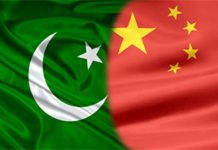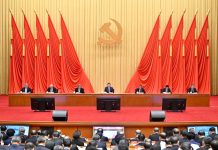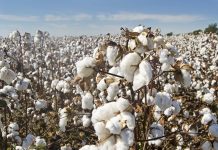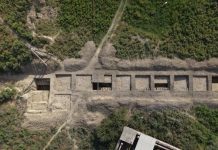
Zhao Hong, a 56-year-old resident in Bejing, recalls the neighborhood of the Beijing Zoo in the capital’s western district of Xicheng being a buzzing place with shops and vendors everywhere.
A decade ago, when Zhao went there to buy clothes, the crowds would thicken as soon as she exited the subway during holidays. Visitors could also see a stone tablet there inscribed with “China’s Clothing Brand Incubation Base.”
The neighborhood, known as Dongpi, was once the largest clothing wholesale market cluster in north China, where 11 clothing wholesale markets were located.
As times change, Beijing’s industrial development continues to upgrade. Some golden eras may have passed, but new ones have arrived.
After clothing wholesale markets being relocated, Dongpi has now become an incubation base for financial technology (fintech).
How to achieve green development in traditional industries has also been a topic when Beijing sees industrial upgrading or transformation.
In the 1960s, Yanshan Petrochemical, a modern oil refining base located in southwest Beijing’s Fangshan District, emerged to ensure the supply of refined oil products to the city. It has now embarked on a path of green development, and become a supplier of clean energy.
“Our company accounts for about 50 percent of the hydrogen supply in the Beijing market,” said Li Junliang, chief expert at Sinopec Yanshan Petrochemical Co., a key hydrogen supplier for the capital, told Beijing Review. Since its first delivery on December 16, 2020, the company has supplied nearly 3,100 tons of fuel-cell hydrogen products.
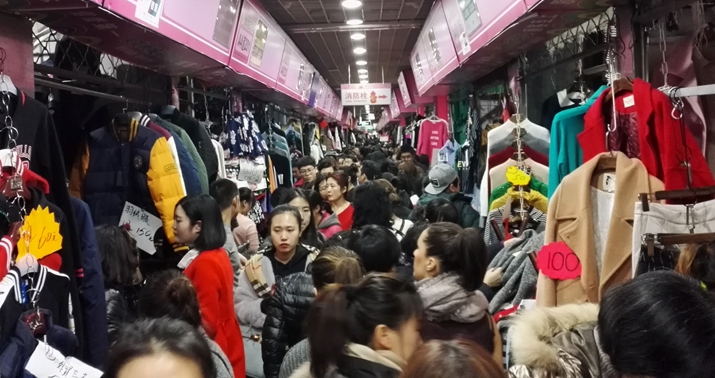
Beijing’s Dongwuyuan Julong Clothing Wholesale Market (above) in December 2015 (COURTESY PHOTO)
A new market
Formed in the 1980s, Dongpi attracted merchants from all over the country to rent shops and engage in clothing wholesale. Many individual vendors set up stalls along the roadside and this economy played a positive role in revitalizing urban, and rural, economies.
The market once bustled with cars, people and goods. At its peak, it employed over 30,000 people and attracted an average of 100,000 daily visitors. Additionally, surrounding industries like dining and logistics provided jobs for over 300,000 people. For tourists visiting Beijing, haggling with wholesalers and shop owners here was a must-do activity.
“The market, located at a transportation hub, was once filled with large packages and stalls selling everything from clothes to food,” Liu Lin, a local official formerly in charge of the relocation of Dongpi, told Beijing Review, adding that large trucks would arrive as early as 3 or 4 a.m. to load and unload goods.
This prosperity brought considerable revenue to the area. Dongpi once generated about 60 million yuan ($8 million) annually for Xicheng. However, the area was also criticized for being dirty, chaotic, noisy and congested. The heavy traffic and safety concerns were a burden on local residents.
According to Liu, the Xicheng government spent over 100 million yuan ($14 million) annually on management fees, mostly to maintain security, manage traffic and improve the environment.
Eventually, the relocation began. “Some merchants moved to Tianjin [Municipality], while others relocated to Hebei Province, both not far from Beijing. We also introduced a range of compensation mechanisms,” Liu said.
By the end of 2017, with the closure of the Dongding Market–the last remaining one in the area–the era of Dongpi had come to an end.
In early 2018, Beijing decided to establish a fintech zone there. Dongpi has since become the National FinTech Demonstration Zone, aka Jinke New Area.
Liu often cycles from his home to the Jinke New Area, which exudes a sense of sophistication and technological advancement. “The current Dongpi often gives me a feeling of being in a different universe,” he remarked when asked how he felt about the changes in the once familiar wholesale market.
As of this year, 184 new institutions have settled in the area, with registered capital exceeding 110 billion yuan ($15 million). In 2023, tax revenue at all levels exceeded 1.5 billion yuan ($0.2 billion), 25 times that before the relocation. The former Dongpi wholesale market cluster has been transformed, offering 350,000 square meters of high-quality industrial space.
The New Power FinTech Center is a landmark building in the area. Within its 60,000 square meters, 51 enterprises have settled. On the second floor of this office building, you will find a creative sculpture paying tribute to the Dongpi practitioners who once worked here. This installation art, made from silk threads and clothes hangers from the former Dongpi, mirrors the hope of nurturing more fintech unicorns and their potential to thrive here.
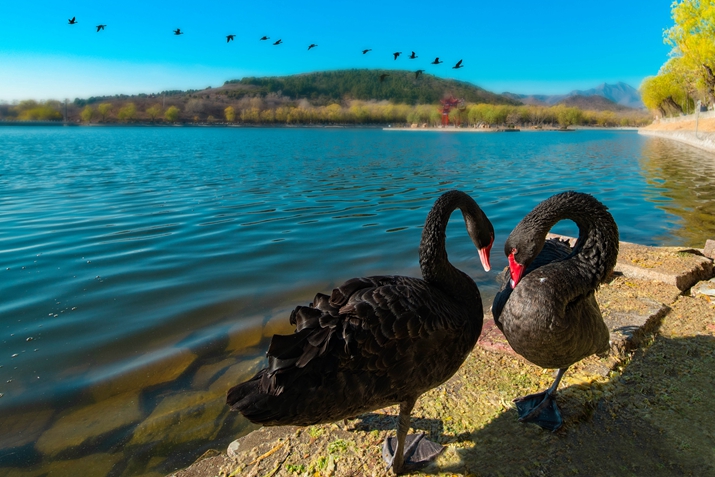
Black swans rest in the Niuyukou Wetland Park (COURTESY PHOTO)
Go with the flow
Hydrogen, with water as its only combustion product, is the cleanest energy in the world. According to Li, during the Beijing 2022 Winter Olympic and Paralympic Games, the high-purity hydrogen produced by Yanshan Petrochemical was used as fuel to successfully ignite the main torch at the Bird’s Nest, aka the National Stadium.
But green development extends beyond this.
Adjacent to the factory, the Niukouyu Wetland Park was once a reservoir that collected production and domestic wastewater from Yanshan Petrochemical, providing basic biological oxidation treatment for the wastewater and serving as flood storage.
However, the reservoir’s wastewater treatment capacity was limited at that time. In 2017, the wetland adopted a comprehensive industrial wastewater purification plan, becoming the first artificial wetland located within an industrial zone nationwide. The ecology has since continued to improve, attracting more and more birds to settle and rest, enriching biodiversity.
On the shore of a vast water area, the park has set up a telescope, where tourists queue up to observe birds, and some even use their phones to photograph the birds through the telescope. Especially in recent winters, photography enthusiasts frequently visit the wetland to photograph birds, capturing many wonderful moments of various bird species. Currently, over 140 species of wild birds have been discovered in the wetland.
As the autumn breeze sweeps across the wetland park, water birds hover under the blue sky and the flowing water is crystal clear. It’s hard to imagine that this river water is purified from sewage.
“In the context of traditional industries, we can also, through management, enrich biodiversity. This is actually what we, as a company, want to do: Follow the trend and benefit the people,” Li concluded. –The Daily Mail-Beijing Review news exchange item

